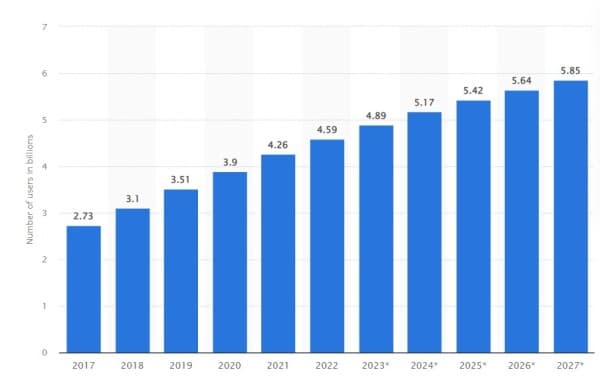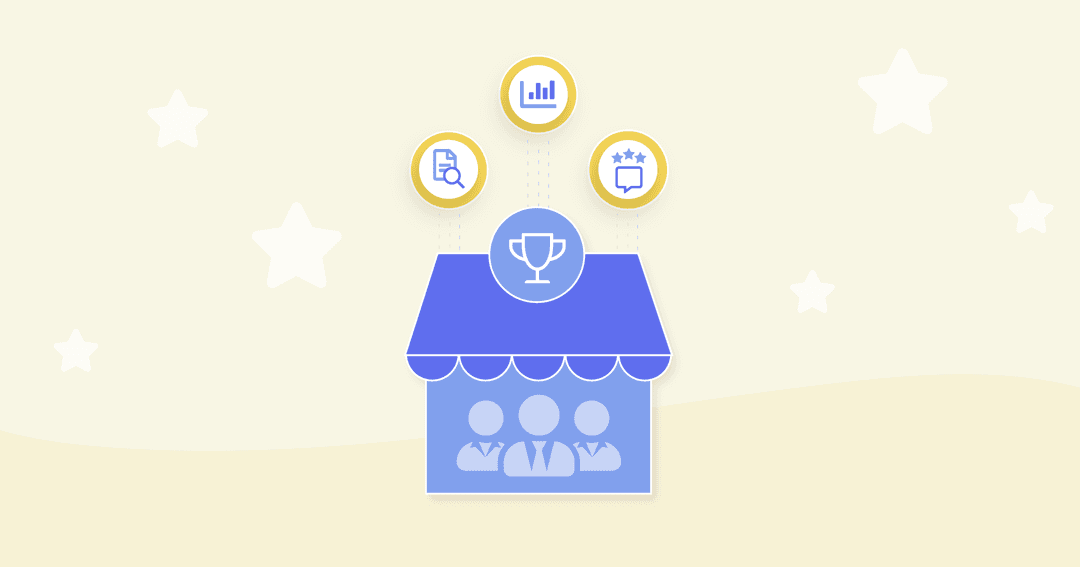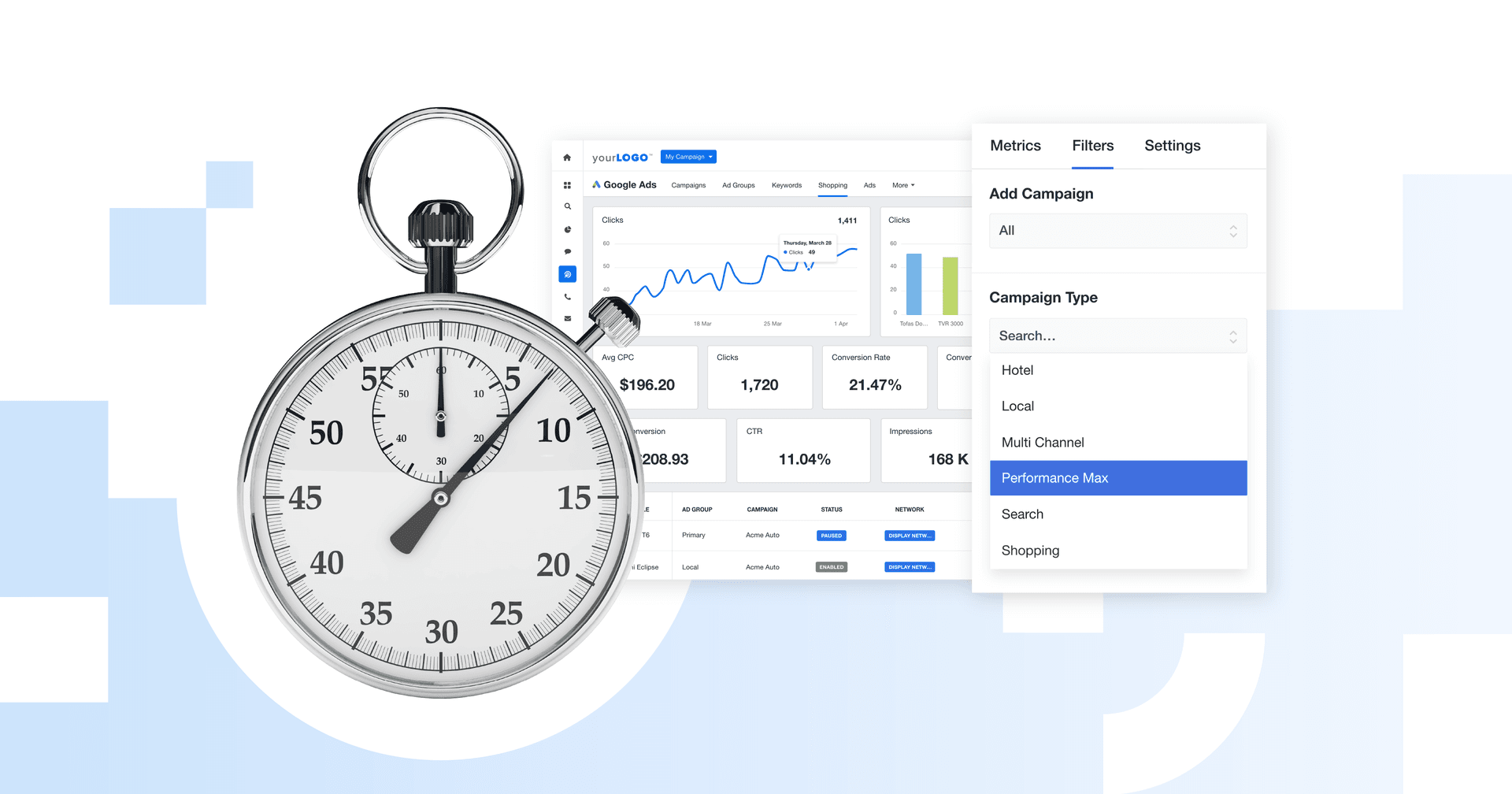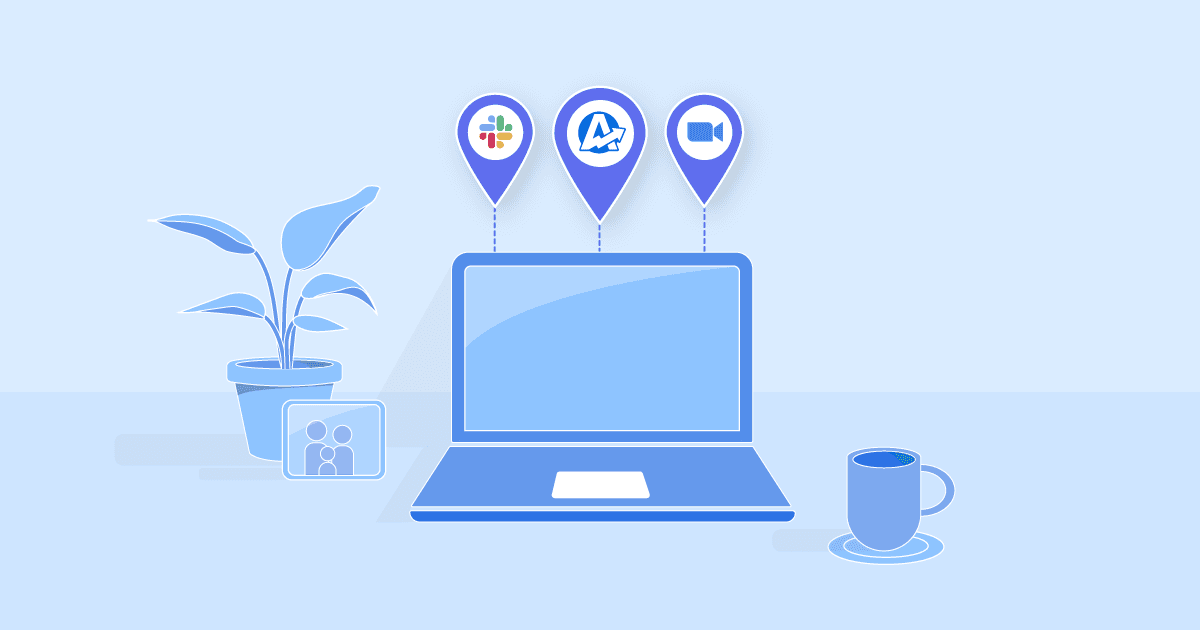Table of Contents
QUICK SUMMARY:
Differentiating a marketing agency requires agency owners to establish a unique brand presence and authority in their industry. Amidst the rapid growth of social media users and digital content, standing out now means innovative tactics are a non-negotiable for client acquisition and lead generation. This article covers practical strategies for agencies to distinguish themselves, offer improved client solutions, and sustain long-term growth.
Take a moment, get nostalgic, and think about when you started your digital marketing agency. Whether it was last year, five years ago, or you’re an industry dinosaur, it’s almost sure that you have refined your digital marketing services, and your strategy has changed.
Technologies, marketing agency tools, and even fundamental marketing philosophies are sweeping into entirely new fields of marketing to the point where the competitive agency landscape feels over-saturated.
So, how do you differentiate your agency from the pack? How can you stand out, increase lead generation, build a solid social media presence, and stay on top of the game?
Apply some thoughtful analysis of these eight fundamental aspects to your agency:
Why Your Agency Has to Stand Out To Succeed
We live in the advent of digital marketing and are constantly bombarded with information. From images to entertaining 15-second clips, there is a barrage of content competing for that one coveted thing–user attention. In 2021 alone, there were 4.26B social media users, which is on track to grow even more over the next few years.

Every digital marketing agency like you has another business with the same target market and objectives. You are competing for clients and vying for that top-of-mind referral when someone asks, “Do you know of any good digital marketing agencies?”
Therefore, it’s a no-brainer for your agency to stand out and ensure a strong authority and a consistent brand presence to help reach your lead generation and client acquisition goals.
It certainly isn’t an easy feat to keep a competitive advantage, but there are a few tactics to pivot your agency towards success. By consistently putting in the work, you’ll also be able to sustainably scale a small business to an enterprise-level marketing agency.
What Clients Look For in a Marketing Agency
Put yourself in your client's shoes. Does your brand positioning come across as "digital marketing experts"? Do you offer the right marketing solutions? And where does your agency stand compared to competitors? There are a lot of considerations to be made before your client signs off on that agency services contract. And it’s in your best interest to know what they are. Here are some key characteristics your potential clients are looking for in a digital marketing agency.
A Track Record of Success
When hiring a marketing agency, prospective clients are looking for a cutting-edge expert with a solid portfolio of work. That’s where your credibility, expertise, and success metrics come in. These can include:
Client testimonials on your website, Google My Business profile, social media pages, company profile, and relevant directories
Quantifiable metrics (such as number of clients, successful projects, and years of experience)
Content marketing that reflects your in-depth knowledge, such as educational videos/reels and case studies
If you’re a small business that’s now dipping your feet in the marketing waters, it may be a challenge to source reviews. Not to worry, though—we all start somewhere. In this case, build a bank of content marketing that showcases your knowledge (such as a social media video series, e-book, email marketing, or long-form blogs).
If applicable, create examples of what your target market is looking for (such as a social media graphic, promotional video, or flyer). Over time, keep track of your work, and in no time, you’ll have an agency portfolio to showcase.
Timely and Consistent Communication
Whether you’re a small freelance business or a large-scale digital marketing marketing agency, clients want to know you’re easily accessible and approachable. Time is of the essence in the outreach and onboarding phases (first impressions are lasting impressions, after all).
Ensure timely communication by:
Providing professional client reports on a predictable schedule
Addressing any client concerns promptly or giving a timeline for a response
Setting up regular touchpoint meetings (such as monthly or bi-weekly discussions to evaluate performance and tweak strategies)
Having an assigned liaison (such as an Account Executive)
Outlining your agency’s processes for more complex projects (through a flow chart, for example) and evaluating response times at each phase
Stating your agency’s hours of operation and procedures for ad-hoc or urgent requests
Having systems in place–especially for communication–goes a long way and helps you anticipate what clients may ask about.
Over time, tighten your agency’s time management and evaluate any areas for improvement by seeking your clients’ feedback.
A Marketing Agency That Gets It
When a client approaches your agency, they don’t only want you to ramble off a list of services that don’t apply to their situation. While you may be eager to share those aesthetic social media graphics in your extensive portfolio, it won’t mean much if your client only wants tracked keywords.
Clients want to be heard and have their marketing questions and pain points resolved, which sometimes means shifting gears or even saying ‘No.’
Adopting a listening ear and presenting the best solution is always the way. Not only does it reiterate your excellent customer service skills and shows you’re not trying to upsell blindly. Find a niche and tailor your services to the type of client you’re looking to serve.
How To Differentiate Your Digital Marketing Agency
Following a few actionable steps will yield positive results as the months go by. But keep in mind that it’s unrealistic to expect an immediate effect after putting things in place.
Take a strategic approach, build a solid foundation, and work towards differentiating your agency to stand out from your competitors.
Slow and steady wins the race! Wondering where to begin? Here’s how you can get the ball rolling.
Create an Ideal Customer Profile
First things first–who are you marketing your agency’s services to?
Unless you’re absolutely clear on who your target audience is, you likely won’t attract the right type of clients. Before you hit the ground running, conduct research such as surveys, online sweeps, or other methods to evaluate potential target markets.
Use these valuable insights to create an ideal customer profile (ICP) that you can reference when conducting those outreach exercises and deciding which organizations to approach for business. An ICP should include an organization's firmographics and other relevant company information like location and revenue level.
Agency Tip: In addition to outlining an ICP, go further by creating buyer personas. This exercise will dive deeply into crucial personnel's pain points and experiences within any ICP. It also provides clear contact points when your team reaches out to potential clients.
Know Your Agency’s Unique Selling Proposition
To help you define your marketing agency’s unique selling proposition (USP), ask yourself:
What challenge(s) are my clients currently facing?
What are the features of my services that help to solve this dilemma?
Are there specific industries that benefit from my services?
Is there a service or feature my agency offers that’s notably different from competitors?
Does my target audience differ from my competitors’ audience(s)? What's my market positioning?
Is there a pain point my target audience is experiencing that’s not reflected in my agency’s services?
What types of marketing solutions do my competitors offer?
What's my unique value proposition compared to competitors?
As you can see, determining your agency’s USP means you have to know what’s on the market. Go a step further by conducting a competitor SWOT analysis which will help you identify unchartered opportunities.
Looking for a quantifiable, strategic way to stay one step ahead? Track competitor keywords, monitor backlinks for new opportunities, and perform SEO audits regularly. It's a useful tactic to stand out in the competitve world, especially when clients have many agencies to choose from.
My favorite SEO tool is AgencyAnalytics because it ties all the relevant client reports we need into one convenient dashboard, including rankings, call tracking, reviews, directories, social media, email, and Google Analytics. As our company has grown, the value of seeing a client's overall internet marketing health in less than a minute has increased exponentially.
Kellen Kautzman, Owner, Send it Rising
Learn From Other Successful Digital Marketing Agencies
We can all learn a thing or two from our peers and even competitors. Keep an open mind and objectively observe what’s working well for other digital marketing agencies within your sphere. Is it that agency's brand presence aesthetically pleasing? Or perhaps it’s their high messenger response rate.
Whatever the case, there will always successful agencies who have built a success story you can aspire towards (take Perth Website Design, for example). To understand what works for another agency:
Evaluate their website content and calls to action to decipher who their target audience is
Observe engagement and feedback on social media
Read any educational insights such as case studies they worked on previously
Check their client testimonials and reviews to see what others are saying
Observation is key here. Take a page from another agency’s book by learning from their mistakes, pivot points, and successes.
Industry and Service Specific Firms Have a Leg Up
Have you ever really broken down what you consider success for your business?
It’s tempting to try to be all things to all people. To complicate matters, different services within digital marketing are becoming increasingly integrated.
For instance, it’s essential to understand how content marketing impacts SEO and PPC or how customer service impacts reputation management and social media (and vice versa).
Many small businesses try to offer a one-stop-shop solution for all things marketing. Still, unless you’re a massive organization, providing expert services across disciplines can be challenging.
No agency can specialize in everything. It’s impossible because there are too many moving parts. If you try to be a master of everything, you’ll be a master of nothing.
Mark Jamieson, Managing Partner, WSI eStrategies
You need to know the types of businesses you’re targeting and the industries that they’re in. Insights and best practices in marketing for lawyers will be significantly different than marketing for dentists or real estate agents.
According to Oberlo, there are over 32.5M small businesses in the US. That’s too many clients just for your marketing agency! You only have enough time and resources to serve a specific number of clients, so why not focus on becoming the expert in a particular industry?
When you focus on a specific industry, you’ll be able to communicate better the value and knowledge your agency brings to the clients you’re trying to acquire. As a result, you’ll have an advantage over those that don’t focus on a specific industry.
This strategy can also be applied to your location. Being the go-to expert in your region for local marketing can also differentiate you from national competitors.
Agency Tip: Once you focus on both industry and services, develop a list of resources and recommended agencies for when you have a prospect that needs something you’re not offering. Not only will other agencies reciprocate the favor, but that prospect will also be a great source of referrals for clients that are looking specifically for what your agency offers.
Don’t Sweep Analytics Under the Rug
Providing proof of success has always been a valuable way for digital marketing agencies to indicate how they can help clients. As technologies have developed, analytics has become essential for every marketing agency.
Even if you’re not offering technical services like SEO or PPC, you still need to be able to report to your clients that what you’re doing is working and worth the money they have invested in your agency.
KPIs allow us as the agency to demonstrate our value to the client. There are basic KPIs such as spend, clicks, impressions, ranking, etc., but the real KPIs every client wants to know are leads and/or sales. When you can demonstrate this, it increases your retention rate and keeps clients paying you month after month.
Jacob Hicks, Owner, Magnyfi
It’s one thing to have the tools to monitor and report on the analytics you’re generating, but it’s another thing to know what they mean and how to use them.
If you don’t have an analytics specialist on staff, ensure that you have someone on your team learning the best ways to use your client’s data. Your clients will appreciate your services' impact on their bottom line with statistical proof with agency dashboards and customizable report templates.

The data you collect also presents the opportunity to create informative case studies that will influence new prospects when they’re researching your agency as a solution to their marketing problems. In RFPs and your online marketing assets, make sure that you highlight how you use analytics to support your clients and prove results to them.
Agency Tip: Have processes and tools in place to start collecting baseline data for new clients on Day 1. After 3-6 months, approach your most successful clients about using their stats and experience as part of a case study to promote your agency. If you’re producing quality results for them, they’ll be happy to work with you to share their successes.
Don’t Neglect Your Website–It’s Your Digital Storefront!
Your agency needs a website that appeals to your target audience while representing your agency's expertise, culture, and philosophy.
Due to the rapidly changing digital landscape, your site might already be outdated if you haven’t updated your website in 3-5 years! It’s time to take a look at whether the current information and design are relevant to what your prospects are searching for.
Many agencies spend so much time helping their clients that they disregard their own marketing efforts. If you’re overflowing with clients and have no intention of growing your business, it’s easy to see why your website and marketing assets are not a priority.
But if you have your eye on growing your client list and are adding more expert employees to support those clients, you need to ensure that your website addresses the current needs of the modern business person.
And don’t forget about your agency’s Google Business Profile, especially if it’s part of the services you offer (but even if it’s not). And go beyond the basics, just like you would for a client.
As Ryan Redding, CEO of DP Marketing Services says, "It’s about leveraging every available option to the max. Women-owned business? Mark it! Solid seasonal promo offers? Feature them! Just took some new company photos? Highlight them! In our experience, the companies who do the little things well have massive success."
Research your competition and see what they’re doing. If you see holes in their value proposition, you can capitalize by filling in those gaps on your own site’s copy.
Agency Tip: You don’t necessarily have to redesign your website all at once. If you consistently make minor adjustments, getting up to date doesn’t feel like such a massive endeavor.
Social Proof: Spotlight Your Client Support
Whether via your website, social media channels, or online reviews, social proof is a very real psychological influence on purchasing decisions. Prospects will be researching your online presence and sometimes coming to conclusions about your marketing agency before ever contacting you.
It can be frustrating not being able to explain the value of your agency in a face-to-face meeting or even via a phone call. You need to put your best digital foot forward at all times. You never know who is looking at you.
Beyond your website, generating social proof on third-party sites will influence your online reputation and help you stand out from other agencies. That might well be Google or Facebook reviews, or it might be creatively engaging happy clients to get them to share the good word about your agency on social. Their shares reach their audience and increase your agency’s visibility. And that’s power!
These value propositions trump other kinds of marketing because the “voice of the customer” is a more powerful and trusted voice. Online reviews have continued to grow and represent one of the newer strategies to help your agency acquire new clients.
Here are additional strategies to differentiate yourself from your competition:
Be active on at least two social media channels (where your clients are engaged), have social links on your website, and frequently request others to follow you.
Include case studies of your successful campaigns highlighting the analytics that prove the results you were able to garner for your clients.
Spotlight testimonials and reviews (from 3rd party sites) on your website.
These may feel like minor things, but they can significantly impact getting the word out about your fantastic services.
Meet People and Educate Yourself
Finding time in your day for your own professional development can be a significant challenge, but being up to date on the latest trends, techniques, and strategies will enhance the value you provide to your clients.
If your agency invests in professional development, the best way to keep up is to attend professional educational events and trade shows in your specific industry. If you work in a remote location where it’s difficult to participate in events, find events that provide virtual access, attend webinars or frequent forums and live streams focused on your niche.
The in-person events are where you will get the most bang for your buck. Not only will your agency’s employees benefit from the scheduled sessions and workshops, but these events are also an opportunity to connect with other marketers that offer complementary or similar services in a different vertical.
Agency Tip: Always bring plenty of business cards-both physical and digital versions-to conferences and networking events. If someone asks you for your card, make sure you can give them one.
Takeaways
Even if your agency has been around for a while and you think it’s too late to apply some of this advice, that’s never the case. You can always pivot your agency’s strategy significantly if it will help your bottom line and give your agency a more focused purpose.
Reassess your target audience and decide if it’s more effective to focus on a few specific industries.
Set up your assets to track the data correctly. If you don’t currently use analytics to prove the impact of your agency’s services, hire or contract someone that knows how to. New clients will appreciate the data analysis of their campaigns and marketing projects.
Don’t neglect your website. It’s going to be important that prospects can find all of the information they need when deciding to hire your agency. If there’s info that they can’t find, they might be more likely to go directly to a competitor than ask you about the omitted information they need to make an informed decision.
Use social proof to show why you’re the best in your field. The digital world is becoming more social, and other people’s opinions on various social channels matter to your prospects. It's also a way to attract clients and build your agency's reputation.
Network and encourage ongoing learning. You’re increasing your knowledge about the industries and services you help. You’re also generating contacts who might become clients or refer clients to you based on your interactions at the events you both attended.
Many of these strategies take time. It’s difficult to see results immediately. But like any long-term project, the more you invest in your agency’s online presence, the more it will pay off in the long run with plenty of satisfied clients.

Written by
See how 7,000+ marketing agencies help clients win
Free 14-day trial. No credit card required.






